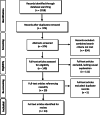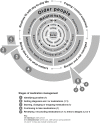Towards an understanding of the burdens of medication management affecting older people: the MEMORABLE realist synthesis
- PMID: 32498672
- PMCID: PMC7272211
- DOI: 10.1186/s12877-020-01568-x
Towards an understanding of the burdens of medication management affecting older people: the MEMORABLE realist synthesis
Abstract
Background: More older people are living in the community with multiple diagnoses and medications. Managing multiple medications produces issues of unrivalled complexity for those involved. Despite increasing literature on the subject, gaps remain in understanding how, why and for whom complex medication management works, and therefore how best to improve practice and outcomes. MEMORABLE, MEdication Management in Older people: Realist Approaches Based on Literature and Evaluation, aimed to address these gaps.
Methods: MEMORABLE used realism to understand causal paths within medication management. Informed by RAMESES (Realist And Meta-narrative Evidence Synthesis: and Evolving Standards) guidelines, MEMORABLE involved three overlapping work packages: 1) Realist Review of the literature (24 articles on medication management exploring causality); 2) Realist Evaluation (50 realist-informed interviews with older people, family carers and health and care practitioners, explaining their experiences); and 3) data synthesis and theorising from 1) and 2).
Results: Medication management was viewed from the perspective of 'implementation' and structured into five stages: identifying a problem (Stage 1), getting a diagnosis and/or medications (Stage 2), starting, changing or stopping medications (Stage 3), continuing to take medications (Stage 4), and reviewing/reconciling medications (Stage 5). Three individual stages (1, 3 and 4) are conducted by the older person sometimes with family carer support when they balance routines, coping and risk. Stages 2 and 5 are interpersonal where the older person works with a practitioner-prescriber-reviewer, perhaps with carer involvement. Applying Normalisation Process Theory, four steps were identified within each stage: 1) sense making: information, clarification; 2) action: shared-decision-making; 3) reflection/monitoring; and 4) enduring relationships, based on collaboration and mutual trust. In a detailed analysis of Stage 5: Reviewing/reconciling medications, adopting the lens of 'burden', MEMORABLE identified five burdens amenable to mitigation: ambiguity, concealment, unfamiliarity, fragmentation and exclusion. Two initial improvement propositions were identified for further research: a risk screening tool and individualised information.
Conclusions: Older people and family carers often find medication management challenging and burdensome particularly for complex regimens. Practitioners need to be aware of this potential challenge, and work with older people and their carers to minimise the burden associated with medication management.
Trial registration: PROSPERO 2016:CRD42016043506.
Keywords: Burden; Complexity; Informal carers; Medication management; Medication optimisation; Multi-morbidity; Normalisation process theory; Older people; Polypharmacy.
Conflict of interest statement
Ian Maidment was a member of the West Midlands NIHR RfPB committee from January 2014 to December 2018. Geoff Wong is Joint Deputy Chair of the National Institute for Health Research Health Technology Assessment Programme Prioritisation Committee A. Andrew Booth holds several NIHR Committee Memberships including the NIHR HS&DR Funding Committee, Systematic Reviews Programme Advisory Group and the Complex Reviews Advisory Group. He is also co-director of the NIHR HS&DR Evidence Synthesis Centre and a newly awarded NIHR PHR Evidence Synthesis Centre. There are no other competing interests.
Figures
Similar articles
-
Medication management in older people: the MEMORABLE realist synthesis.Southampton (UK): NIHR Journals Library; 2020 Jun. Southampton (UK): NIHR Journals Library; 2020 Jun. PMID: 32579319 Free Books & Documents. Review.
-
Family carers' experiences of managing older relative's medications: Insights from the MEMORABLE study.Patient Educ Couns. 2022 Jul;105(7):2573-2580. doi: 10.1016/j.pec.2021.12.017. Epub 2021 Dec 31. Patient Educ Couns. 2022. PMID: 35016779
-
Deprescribing medicines in older people living with multimorbidity and polypharmacy: the TAILOR evidence synthesis.Health Technol Assess. 2022 Jul;26(32):1-148. doi: 10.3310/AAFO2475. Health Technol Assess. 2022. PMID: 35894932 Free PMC article. Review.
-
What makes a multidisciplinary medication review and deprescribing intervention for older people work well in primary care? A realist review and synthesis.BMC Geriatr. 2023 Sep 25;23(1):591. doi: 10.1186/s12877-023-04256-8. BMC Geriatr. 2023. PMID: 37743469 Free PMC article. Review.
-
Approaches used to prevent and reduce the use of restrictive practices on adults with learning disabilities: a realist review.Health Soc Care Deliv Res. 2025 May;13(14):1-64. doi: 10.3310/PGAS1755. Health Soc Care Deliv Res. 2025. PMID: 40326249 Review.
Cited by
-
Tools to evaluate medication management for caregivers of people living with dementia: A systematic review.Health Expect. 2021 Oct;24(5):1570-1581. doi: 10.1111/hex.13318. Epub 2021 Jul 21. Health Expect. 2021. PMID: 34289214 Free PMC article.
-
Tools to measure barriers to medication management capacity in older adults: a scoping review.BMC Geriatr. 2024 Mar 27;24(1):285. doi: 10.1186/s12877-024-04893-7. BMC Geriatr. 2024. PMID: 38532328 Free PMC article.
-
Increasing prevalence of anticholinergic medication use in older people in England over 20 years: cognitive function and ageing study I and II.BMC Geriatr. 2020 Jul 31;20(1):267. doi: 10.1186/s12877-020-01657-x. BMC Geriatr. 2020. PMID: 32736640 Free PMC article.
-
Defining, identifying and addressing problematic polypharmacy within multimorbidity in primary care: a scoping review.BMJ Open. 2024 May 24;14(5):e081698. doi: 10.1136/bmjopen-2023-081698. BMJ Open. 2024. PMID: 38803265 Free PMC article.
-
'It's a job to be done'. Managing polypharmacy at home: A qualitative interview study exploring the experiences of older people living with frailty.Health Expect. 2024 Feb;27(1):e13952. doi: 10.1111/hex.13952. Health Expect. 2024. PMID: 39102701 Free PMC article.
References
-
- Office for National Statistics. What does the 2011 Census tell us about older people 2013.
-
- Office for National Statistics. Overview of the UK population: November 2018 [Internet]. 2018 [cited 2018 Feb 7]. Available from: https://www.ons.gov.uk/peoplepopulationandcommunity/populationandmigrati....
-
- Parliament UK. The ageing population: key issues for the 2010 Parliament [Internet] 2010. Available from: https://www.parliament.uk/business/publications/research/key-issues-for-....
-
- House of Commons Health Committee. Managing the care of people with long-term conditions [Internet]. London; 2014. Available from: https://publications.parliament.uk/pa/cm201415/cmselect/cmhealth/401/401....
-
- Aiden H Multimorbidity understanding the challenge. London; 2018.
Publication types
MeSH terms
Grants and funding
LinkOut - more resources
Full Text Sources
Medical




